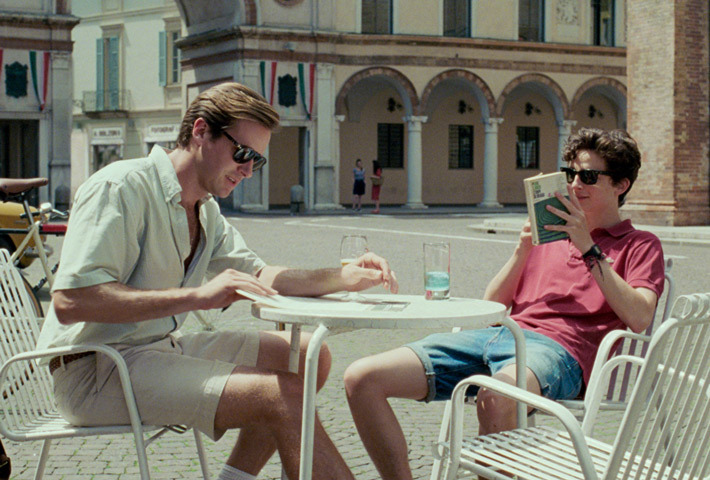
It goes without saying that the biggest entertainment story of the year was the #MeToo movement and how it took down—and continues to take down—some of the most powerful men in Hollywood. Kevin Spacey was replaced, at the eleventh hour, by Christopher Plummer in Ridley Scott’s All the Money in the World (a film I’ve yet to see) and, for his efforts—which he apparently did without breaking a sweat—Plummer was rewarded with a Golden Globe nomination. Louis C.K.’s I Love You, Daddy was yanked by its studio shortly before its release (I’ve seen it; trust me, you’re not missing much). The seemingly endless Harvey Weinstein stories continue to be stomach churning—and show that he wasn’t just an alleged sexual abuser and predator, but a man who wielded his enormous power to blacklist and intimidate intelligent actresses, including Salma Hayak, Mira Sorvino, and Ashley Judd.
And of course, the less said about Dustin Hoffman, the better.
But let’s focus on the positive: 2017 was also a great year for film—with unusually good blockbusters (Thor: Ragnorak, The Last Jedi, and my beloved Wonder Woman), all sorts of interesting and weird art films, many of which you’ll see on my list, and some solid old-school cinema from the likes of Christopher Nolan and Steven Spielberg. For me, the biggest surprise of the year was how much Netflix continues to emerge as a powerhouse: Two Netflix films are in my Top 10; one receives honorable mention. Looking at my list, I don’t see any coherent theme, which is actually kind of cool. Film can be so many different things—and can move us so many different ways. The films below were the ones that moved me the most.
*Most of the blurbs are partially excerpted from my previous reviews.
**As of press time, I had not yet seen Paul Thomas Anderson’s The Phantom Thread.
1. Call Me By Your Name
Master sensualist Luca Guadagnino brings us this ravishing film about the exquisite agony of first love. In Northern Italy, a bookish young man named Elio (Timothee Chalamet) becomes obsessed with Oliver (Armie Hammer), the rakish graduate student staying with his family for the summer. The two young men trade barbs and try to impress each other until they eventually succumb to their desire. All the while, Elio’s intellectual parents watch, with concern for their son mixed with jealousy, because is there anything more heady than young love?
As he did so well in A Bigger Splash, Guadagnino draws us into this bourgeois-bohemian life: the lazy days spent reading and playing music, sunbathing by the lake, eating al fresco, drinking wine and smoking cigarettes (so many cigarettes). As I watched the film, I’m not sure what I was longing for more: A passionate romance like the kind shared by Elio and Oliver; or a shabby chic summer house in the Italian countryside. (Spoiler alert: It’s the vacation house.) Michael Stuhlbarg, as Elio’s father, empathically delivers the film’s climactic monologue, where he tells his son to lean into his emotions, even the messy stuff. And young Chalamet, bringing all of Elio’s smarts, self-loathing, and romantic rapture to life, gives a performance for the ages.
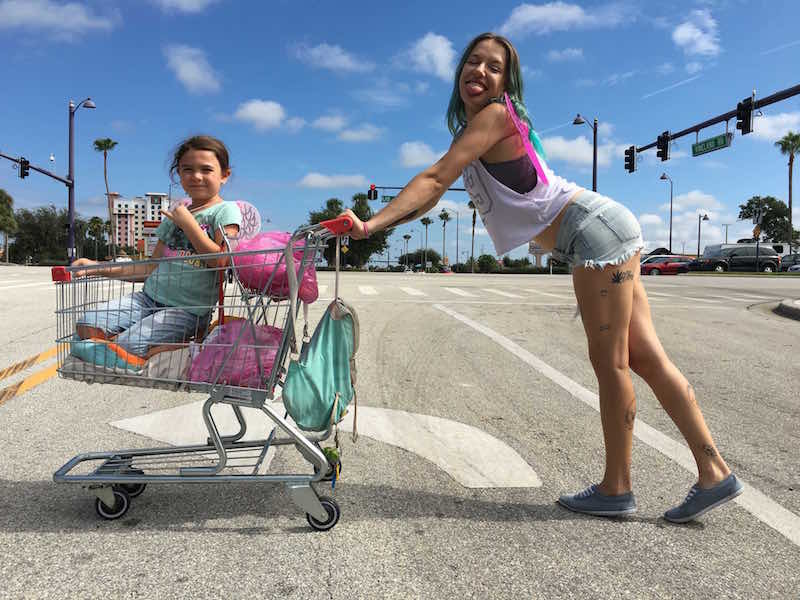
2. The Florida Project
By all accounts, 6-year-old Moonee (Brooklynn Prince), the heroine of Sean Baker’s remarkable The Florida Project, should not be having a happy childhood. She lives with her young mother, Halley (Bria Vinaite) in a seedy motel in the shadow of Disney World. Halley is a dope smoker, a petty thief, a hustler, selling perfume knockoffs and anything else she can swipe on the streets. And yet Moonee is happy. She sees the series of motels as her own personal playground, with best friends—also children of broken families and poverty—as her co-conspirators. They run around freely, breaking into abandoned rooms and buildings; scamming for free ice cream at the local soft serve; spitting on cars in the parking lot to see who has the best aim—all done with an incredible sense of mischief and discovery and fun. Brooklynn Prince, the young actress who plays Moonee, is an absolute find—naturally funny and impish with an impeccable sense of comic timing. One of the best things about Moonee—and Baker’s film in general—is that she is actually funny, not just “kids say the darndest things” funny. The film is enormously respectful of her personhood.
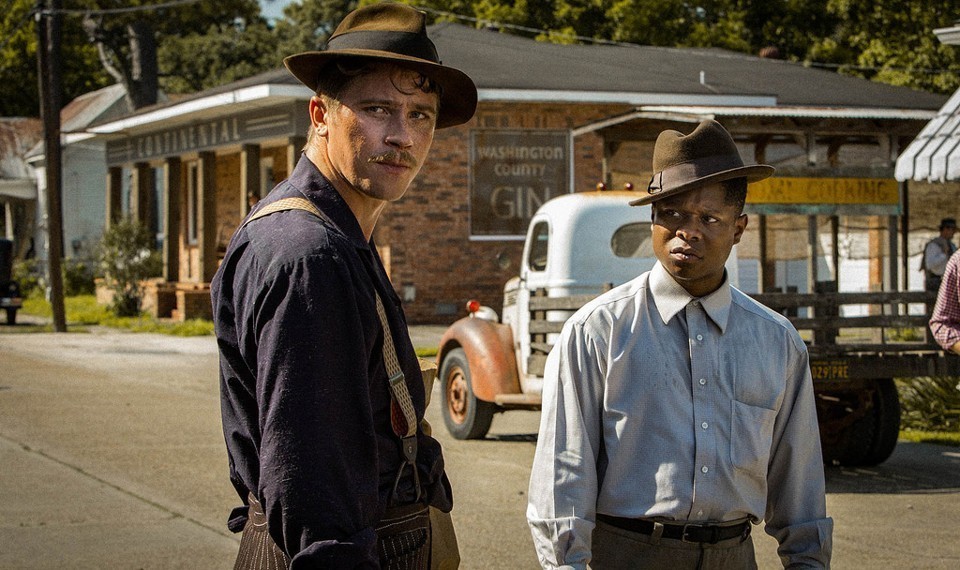
3. Mudbound
Something about Dee Rees’ epic Mudbound is so elemental, so deeply humane, so steeped in the soil and sins of the South, that it already feels like a work of great American cinema. The story is deceptively simple: Two families, one black and one white, share a muddy slog of a farm in the early ’40s south. The white family, while poor, owns the farm. The black family are sharecroppers. They both have young men who go to war. Jamie (Garrett Hedlund) is handsome with a quicksilver charisma. Ronsel (Jason Mitchell) is a devoted son and brother; he bears the extra burden of knowing how much his family needs him to work the farm. The film is narrated, in a kind of sing-song near poetry, by many of the characters, primarily the women. The matriarch of the black family is Florence (Mary J. Blige), a midwife and paragon of unsentimental strength. Laura (Carey Mulligan), married to the solid, unglamorous Henry (Jason Clarke) dutifully endures this life she never asked for. The performances, top to bottom, are unfussy, clear-eyed, and note-perfect. Particular props to Blige, who gives such a confident, understated performance, you’d think she was a canny screen veteran. And Garrett Hedlund and Jason Mitchell will absolutely wreck you.

4. Dunkirk
Christopher Nolan’s stunning WWII saga is an injection of pure cinema: It’s filled with arresting images which it uses to stir, to terrify, and at times to nearly overwhelm its audience. During World War II, thousands of Allied soldiers—the majority of whom were British—were stranded on the shores of Dunkirk, France and surrounded by Nazis, who could easily pick them off from the skies. Their only hope is to be rescued—by fighter pilots and, in a remarkable true twist, by everyday fishermen, who brave the journey across the English channel save them. The story, told by Nolan on three surfaces—land, sea, and air—is, in many ways, about the simple honor of surviving—and, of course, about the stiff upper lip and indomitable pluck of those regular British seamen, embodied perfectly here by the ever-wonderful Mark Rylance. On land, Nolan gives us the single most memorable cinematic image of the year: Overhead, a German bomber approaches, and the allied troops—all 400,000 of them—duck in a kind of harrowing and beautiful choreography of doom, their helmets providing only illusory cover against the assault that’s about to come.
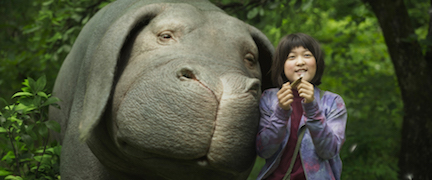
5. Okja
South Korean filmmaker Bong Joon-ho may be a vegetarian, but I can only assume he is a cinematic omnivore, influenced by B-movies, Spielberg, Kurosawa, Miyazaki, Kubrick, Willy Wonka and the Chocolate Factory, and everything in between. His own cinematic vision is a wonderful mishmash of these styles—sentimental yet edgy; dreamy yet caustic. In this film, a line of superpigs are being bred as a potential future food source. When 13-year-old villager Mija (adorably poker-faced Ahn Seo Hyun) finds out the fate of her beloved pig, Okja, she embarks upon an adventure to save him—first to Seoul, then New York, eventually teaming up with a renegade group of animal activists called ALF led by the true believer, Jay (Paul Dano). Tilda Swinton and Jake Gyllenhaal ham it up wonderfully as the villains from the multinational corporation hoping to the breed (and eat) Mija’s pig. As for the computer animation, it’s stunning. Okja, in all her snouty, wrinkly enormity, feels as real as the mutt currently farting and snoring at your feet.

6. Get Out
In Jordan Peele’s excellent horror-cum-satire, he takes a lowkey nightmare—a black man having to endure his white girlfriend’s performatively “woke” parents—and turns it into an actual horror of body snatching and would-be eugenics. The genius of the film is watching our hero, Chris (an excellent Daniel Kaluuya) realize these are not the microaggressions as usual. With Bradley Whitford and Catherine Keener as the super attentive parents, Allison Williams as the breezy post-racial cool girl, Lakeith Stanfield as a zombified black man barely clinging to his humanity, and the wonderful (and criminally overlooked) Betty Gabriel as the eerily submissive maid.
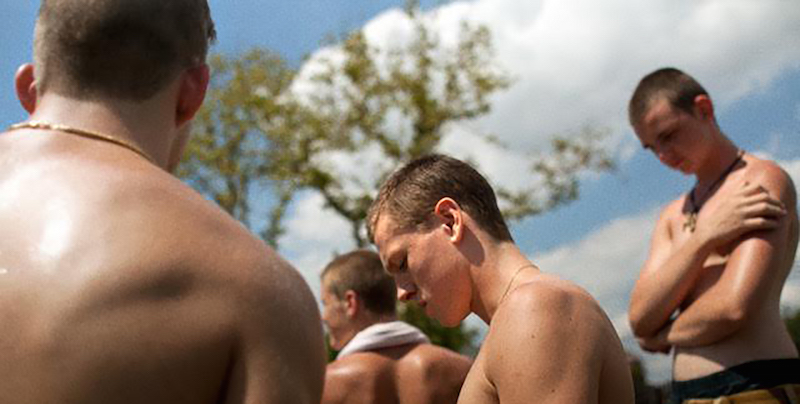
7. Beach Rats
With It Felt Like Love and now Beach Rats, Eliza Hittman has arguably become our greatest chronicler of teenage ennui. It’s summer in Brooklyn and Frankie (Harris Dickinson) spends his long, listless days getting high with his buddies on the beach and his nights prowling the internet looking for older men to hook up with. He’s still deeply in the closet—to his friends, to his mother, even to himself—and he hopes against hope that the feelings will go away. A flirty, pretty girl (Madeline Weinstein) falls for him and he begins to date her—both as an alibi to his friends and to try to will himself to be straight. Meanwhile, his father has just died of cancer, giving him something of a built-in excuse for his moodiness. In a way, the film is about the battle for Frankie’s soul—will he succumb to his friends’ toxic masculinity or will he be true to his own delicate heart? And Dickinson—a Brit!—is extraordinary in his film debut. He plays Frankie as sad and still and wary, with just a barely discernible yearning to be truly seen and understood.
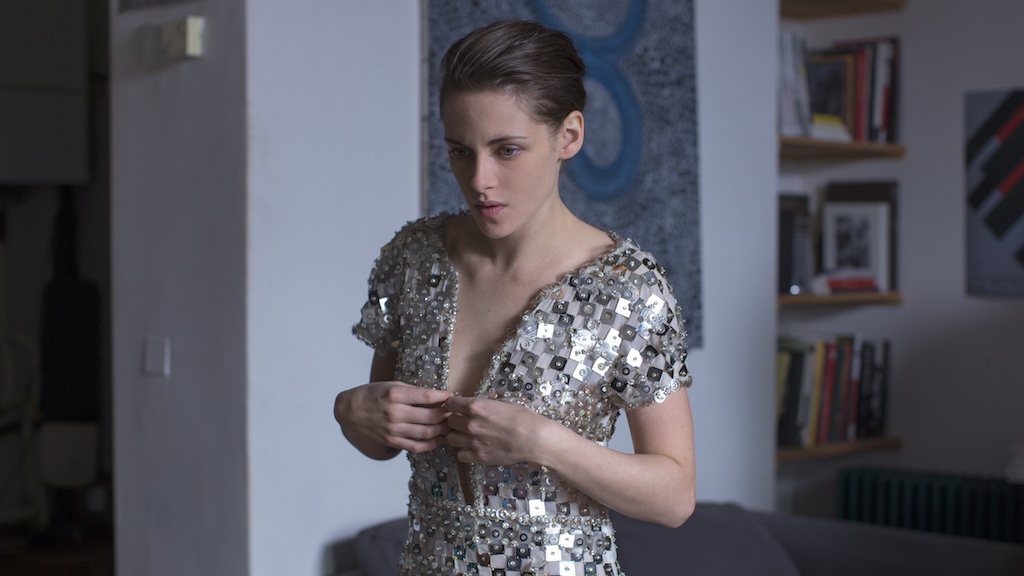
8. Personal Shopper
The beauty of Kristen Stewart—well, aside from her literal beauty, that is—is that she can do almost nothing on camera and still be arresting. I think this is partly because of all the fascinating contradictions she embodies: both feminine and masculine, aloof and inviting, fragile and tough. In Personal Shopper, her second collaboration with French writer/director Olivier Assayas, she plays Maureen, an artist and would-be medium who is also a personal shopper for a spoiled celebutante. Maureen’s twin brother Lewis recently died of a rare heart defect and, thanks to a pact the two shared, she expects him to contact her from the beyond. One day, Maureen is sitting on a bus when she gets a text message from an unknown number. The texter seems to be omniscient—it knows where Maureen is going and claims it’s watching her—and encourages Maureen to ask it questions. “Are you alive?” Maureen asks, chillingly. On Twitter, I noted that Personal Shopper was the most French horror film I’d ever seen (it’s mostly in English, with the occasional French subtitle) and this is because of its obsession with fashion and surfaces, its languid rhythms, and its comfort with ambiguity. The film is largely about loss—how we can essentially haunt ourselves through grief.
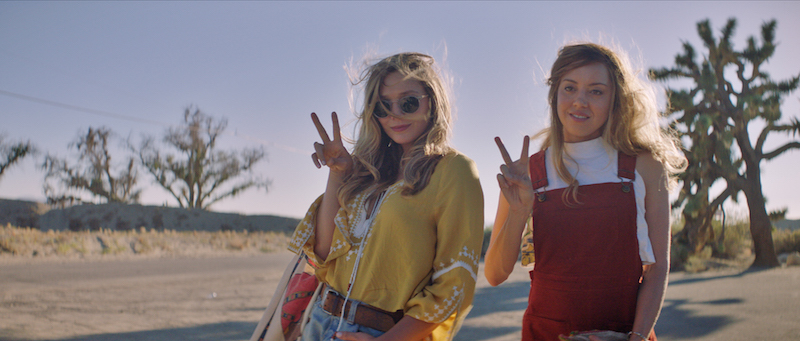
9. Ingrid Goes West
Ingrid Goes West focuses on an especially au courant obsession—Instagram,
that little corner of the social media universe where we post images of
perfectly pedicured toes on sandy beaches, cute corgis in hats, and
crave-worthy waffles. But for Instagram to work there has to be a yin and yang:
both the person who curates an idealized version of themselves and the person
who buys into that persona, hook, line, and sinker. Ingrid (Aubrey Plaza) falls
into the latter category. Early in the film, she drives to southern California
to meet and attempt to ingratiate herself into the life of her current
Instagram obsession: boho-chic social media influencer Taylor Sloane (Elizabeth
Olsen). Director Matt Spicer has obviously spent a lot of time lurking on
Instagram pages and he gets the lingo, the forced fun, the desperate attempt to
seem like you’re not desperate. The message of Ingrid Goes West is a fairly standard one—people
aren’t what they seem on social media. But the execution is spot-on. The cast
is stellar. Plaza makes Ingrid’s unhinged desperation both a little scary and a
lot heartbreaking. As for Olsen, she’s the perfect foil—utterly believable as a
self-styled So-Cal princess.
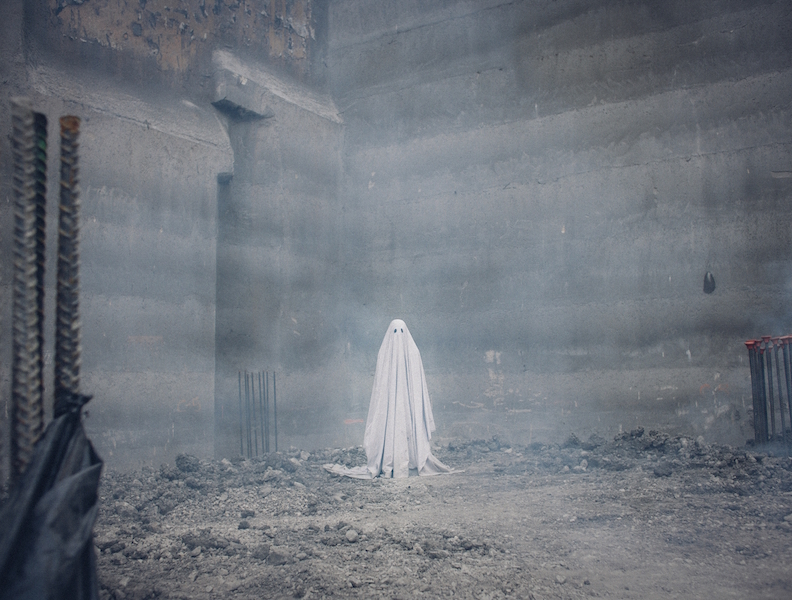
10. A Ghost Story
It’s hard to quantify the
audacity it took for David Lowery to make this film. It’s a ghost story, a
haunting meditation on life, loss, and mankind’s place in the universe, that
features a man under a sheet with the eye holes poked out. Yes, the ghost of
the title is your last minute Halloween costume from when you were a kid—and
somehow, improbably, that’s part of the film’s poignancy. When the film starts,
we meet a married couple, played by Casey Affleck and Rooney Mara—called C and
M in the credits.
As a couple, they have a natural physical intimacy, a nearly
wordless simpatico. And then, there’s a car crash and C dies. M goes to ID the
body; she’s not histrionic, just slow and sad, in keeping with the film’s
rhythms. After, C gets up from the gurney in the morgue, the sheet draped over
him, the eyeholes poked out, and follows her home. Mostly, he just stands
there, useless, sad, silent. Time passes, because that’s what time does. M
leaves the house, but C is stuck there. The film is almost defiantly slow. But
your patience will be more than rewarded. A
Ghost Story has images, ideas, a deep reservoir of sadness about
life, death, and grief, that will stay with me for a while. It unsettled me,
deeply, and rocked me way out of my comfort zone. More films should do that.
11. Battle of the Sexes
A perfectly timed film: In the midst of the women’s lib movement, tennis player Billy Jean King (Emma Stone) breaks away from the patriarchal ATP and forms a free-wheeling, all female tennis league of her own, while also taking tentative steps toward coming out of the closet. Meanwhile, professional irritant Bobby Riggs (Steve Carell), a former pro, several years her senior, challenges her to an exhibition tennis match, to once and for all prove the athletic dominance of men. She has no choice but to agree. The final showdown—about so much more than sports—had my audience on the edge of its seat and cheering lustily for the feminist hero to beat the two-bit conman.
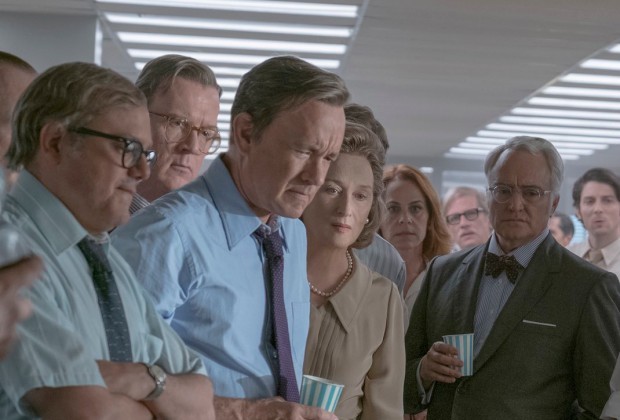
12. The Post
Just as Spotlight showed how dangerously close the Archdiocese was to The Boston Globe, The Post shows how chummy the D.C. press corps can be with politicians and political operatives they covered. Katharine Graham (Meryl Streep), who inherited The Washington Post from her late husband (who, in turn, had inherited it from her father), was as much socialite as newspaper woman, until she is forced to make the most crucial decision of her life. On the eve of her newspaper going public, and to the mortification of her advisors and investors, she agrees—egged on by her tenacious editor Bill Bradlee (Tom Hanks)—to print the Pentagon Papers, the leaked documents proving that the government long-knew the Vietnam War was unwinnable. Helmed by the great Steven Spielberg, The Post is, of course, a snappy newspaper-intrigue movie, filled with last-minute scoops and hush-hush meetings. But watching Streep as Graham come into her own, find her voice as a journalist, a woman, and a moral leader, provides the film’s greatest thrills.
13. The Lost City of Z
James Gray’s has directed the most overlooked film of the year—a true story of obsession and near madness in pursuit of an important archeological and sociological truth. Early in the 20th century, reluctant British cartographer Percy Fawcett (Charlie Hunnam) goes deep in the Amazonian jungle and finds what he believes to be evidence of an ancient, civilized society. The problem is, no one believes him. He keeps returning to the jungle—risking his life, sullying his already fragile reputation, and abandoning his family for long stretches of time. The Brits, of course, can’t stomach the idea that brown people may have been civilized before they were, which makes Fawcett’s journey as righteous as it is wildly impractical. With shades of Apocalypse Now and Mosquito Coast, this film deserves its place among the best of the man’s-obsessive-quest genre.
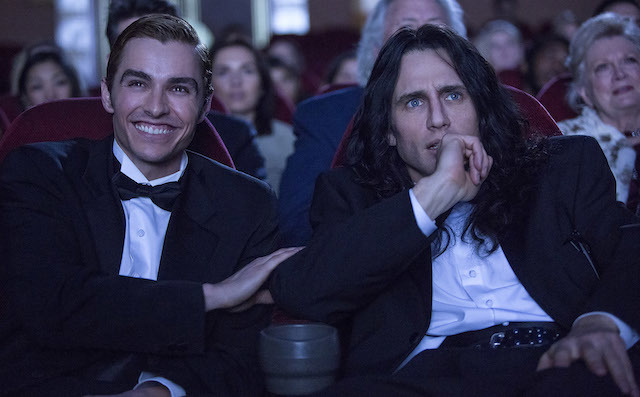
14. The Disaster Artist
James Franco’s comedy about the making of the worst film of all time is both a riveting portrait of a singular weirdo and a sneaky celebration of movie-making and the American dream. As Wiseau, Franco is hilarious and oddly touching, especially in the scenes he shares with Tommy’s increasingly disenchanted best friend (played by Franco’s real-life brother, Dave Franco).
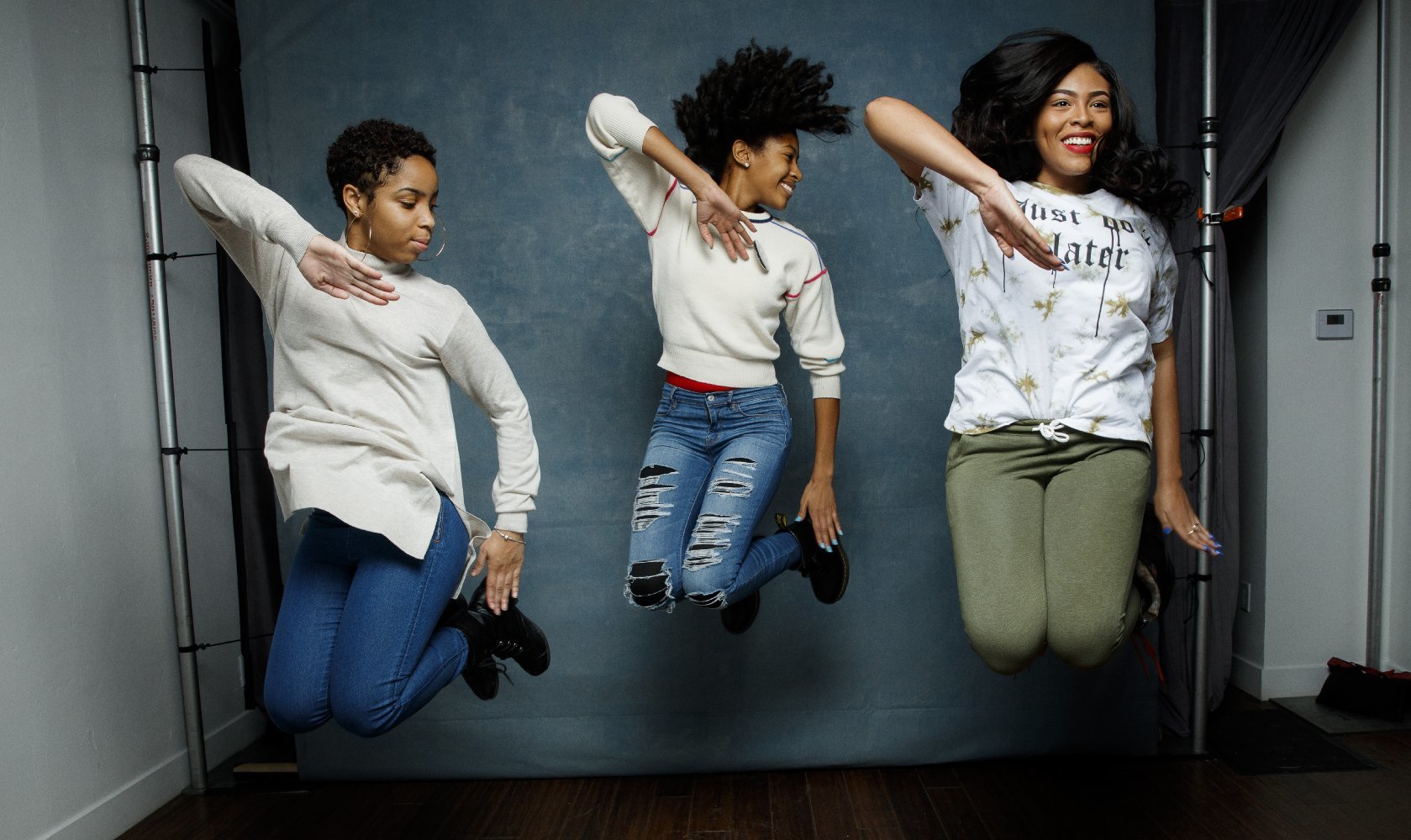
15. Step
The sneaky genius of Amanda Lipitz’s documentary Step is how it manages to tell an important story—about how hard it is to thrive academically when your home life is chaotic and how it takes a village to nurture and support under-served children—in the form of a triumphant “Big Game” narrative. Yes, the Step team at the Baltimore Leadership Academy for Girls has an all-important competition at the end, just like what you might see at the end of a film like Pitch Perfect or Remember the Titans. But the story is really about these girls—the first graduating class of the academy whose goal is to send every student to college—and the amazing group of Baltimore women who raised them.
16. The Big Sick
One of the funniest, warmest, and most closely observed films of the year essentially tells two love stories: The one between Pakistani stand-up comedian Kumail Nanjiani and his grad-student girlfriend Emily (Zoe Kazan) and the one between Kumail and Emily’s squabbling parents (Holly Hunter and Ray Romano) when Emily has a major health scare and is put in a medically induced coma. Based on the unlikely true story of Nanjiani and co-writer Emily Gordon’s own courtship and marriage, the film has lots to say about love, family, and faith. It also has a true generosity of spirit—the characters, flawed as they may be, are all completely endearing.
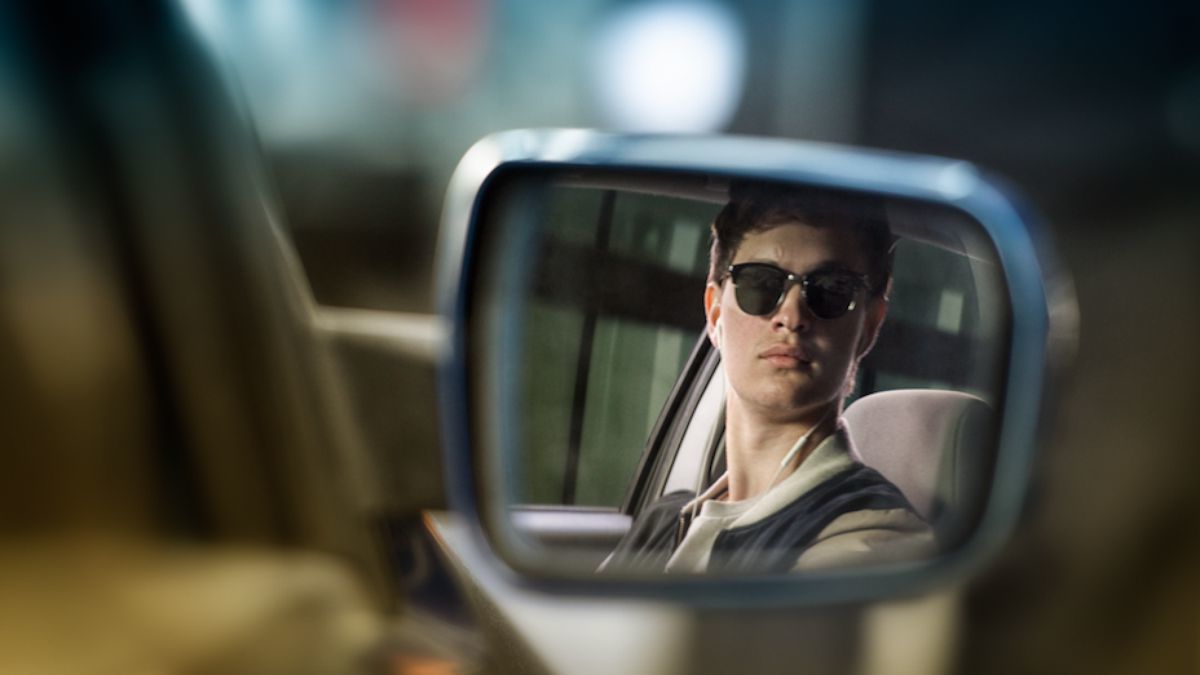
17. Baby Driver
Edgar Wright’s wildly inventive and entertaining film—part winking heist flick, part musical—about a reluctant getaway driver (Ansel Elgort) who moves, drives, and lives to the beat of his own soundtrack is a pure rush of cinematic adrenaline.
18. Wonder Woman
While so many super hero films feel like they were created in a boardroom, Patty Jenkins’ Wonder Woman vibrates with passion and authenticity and life. It wears its influences on its sleeve—a little Raiders of the Lost Ark here, a little Wizard of Oz there—but manages to be its own special triumph. The now-legendary No Man’s Land scene, where Diana/Wonder Woman (Gal Gadot) ignores the protests of her cohort Steve (Chris Pine) and leaps boldly into the battlefield to save a village is the “f**k yeah!” moment of the year.
19. My Cousin Rachel
I call this one Gothic Lite. It has all the elements of the genre: a mysterious death, a desiccated mansion in the hills, a forbidden romance. But it’s remarkably light on its feet—and quite funny. It would work best at a midnight screening, so the crowd can scream “nooooo!” as our dimwitted young hero (Sam Clafin) gets slowly sucked in by the wiles of the mysterious woman he’s convinced killed his cousin. But the film, which will keep you guessing until the end, defies the tropes of the genre at every turn, and provides a perfect showcase for Rachel Weisz’s beguiling charms.
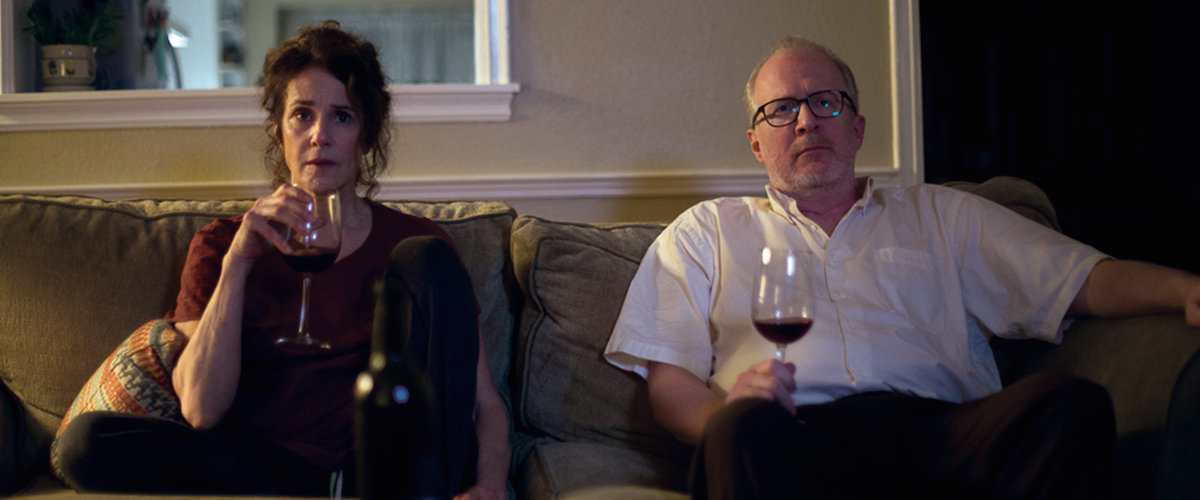
20. The Lovers
A middle-aged couple, played delectably by Debra Winger and Tracy Letts, are each having extramarital affairs. They sneak around, creating elaborate stories about working late and overdue drinks with friends, but all of that is unnecessary—they’ve stopped seeing each other. Then, one day, they watch an old movie and drink wine together on the couch—by their tentative behavior you can tell they haven’t done this in ages. A few days later, they wake up, face-to-face to bed and accidentally kiss each other. Soon, they are cheating on their lovers—with each other. Azazel Jacobs’ film is drolly funny and insightful about the ways marriages ebb and flow. The film would be higher on my list were it not for a bizarre sequence involving the couple’s rage-filled son. But it’s refreshing to see a film that takes the desires and inner lives of 50somethings so seriously.
Runners Up: Blade Runner: 2049; Colossal; Dawson City: Frozen Time; Girls Trip; Lady Bird; The Meyerowitz Stories (New and Selected); Motherland; Nocturama; Only the Brave; Rat Film.
